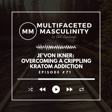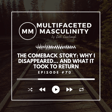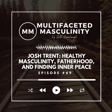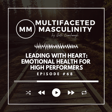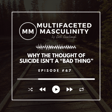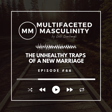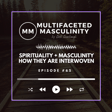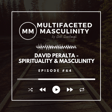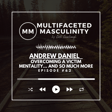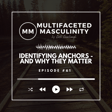Become a Creator today!Start creating today - Share your story with the world!
Start for free
00:00:00
00:00:01

Five Reasons Why You Shouldn't Trust Your Emotions | Ep #40
Men can inadvertently become fickle and reactionary when they begin the journey of "emotional health".
Today we talk about the primary ways your emotions can betray you, and how you can learn to differentiate the process of validating your emotions while not letting them overtake you.
Links:
12-Week Course designed to help you find clarity, get unstuck and build momentum
Transcript
Introduction to Emotional Awareness
00:00:00
Speaker
A man with a weak mind lets his emotions be the dictator of his inner world. Today, we're going to be talking about why you should not always trust your emotions. And I have to say, I have gotten a fair bit of pushback on this concept. I know that a lot of people are
00:00:24
Speaker
really big on speaking your own truth and sharing what you feel and being honest with your emotions. And I agree with all of that. But I also think that there is wisdom in the ability to understand when it serves you and when it doesn't. And there are definitely times that your emotions are not best suited for the situation you may find yourself in.
Subscribe for More Insights
00:00:50
Speaker
Now, if you haven't already, I would really recommend you subscribe to the podcast. I took a little bit of a break over the holidays, but we're new year. We're diving back in. We're going to be firing these off every Monday now. And you don't want to miss some of the episodes that we have coming up and some of the guests that we've got as well.
00:01:09
Speaker
And an ask is, I'd love if you would just take a few seconds to write a review. They mean the world to me. I read every single one of them. I love the feedback and just the dialogue around the topic of masculinity.
00:01:24
Speaker
Alright,
What is Masculinity's Role in Emotions?
00:01:25
Speaker
let's dive into why in the world you should not trust your emotions. Men, we are not simple, chest-thumping, rock-smashing, fire-starting barbarians. We have depth. We intensely feel. We are scared, yet brave. We love to have fun. We're imperfect and make mistakes. We're compassionate and loving. We are multifaceted.
00:01:54
Speaker
Let's explore the reality of masculinity together. For today's episode, you're going to want to sit down, set aside some time and actually listen all the way through because I know the title says that you should not trust your emotions. And I also know that if you have listened to me more than one episode, or maybe this is your first time, I would encourage you to go back and listen to some of the other episodes.
00:02:22
Speaker
I'm a huge proponent of learning how to trust yourself, learning to understand your inner world, learning how to connect to your emotions and validate and honor and acknowledge your emotions. So why in the world would I say there are reasons that you shouldn't trust your emotions? Well,
00:02:45
Speaker
That's what we're going to be getting into today. And I think before we dive into those reasons, you have to first start with understanding what I think is an area that people have blurred the lines where they shouldn't be blurred.
Intuition vs. Emotions
00:03:01
Speaker
And that is the difference between your intuition and your emotions.
00:03:07
Speaker
A lot of men are trying to connect to their emotions and understand them and validate them and let them be present. But they're distorting that with trying to figure out how to trust their intuition. So what they do inadvertently is they trust their emotions in a moment when they really should not trust their emotions.
00:03:30
Speaker
Cause the intuition that comes from the true you that comes from your inner King from this deep internal place of guidance and godliness and strength where emotions, those are feelings that you have based on what a variety of things, right? Your state of mind, maybe your circumstances, maybe a relationship you're in, maybe stress that you're experiencing.
00:03:57
Speaker
It's important to understand why you're having those emotions and learn how to navigate them in a healthy way, but it doesn't always mean that you should trust them because the source for your emotions, those change.
00:04:15
Speaker
You know, your state of mind that changes all the time, your circumstances, stress at work, how much sex have you had or not had? Like the list goes on and on that can change your emotions where your intuition, your intuition is something that doesn't change the source of that intuition.
00:04:36
Speaker
It comes from an eternal place. It comes from something that doesn't get tossed about in the storm of life. It is deeply, deeply anchored in who you are.
00:04:49
Speaker
And so there's an entire journey that you need to go down to learn how to identify and acknowledge and connect to that source of intuition, but not throw out the practical application of doing that while being in control of your emotions.
00:05:12
Speaker
It's actually a really healthy thing to be in control of your emotions. You can control your emotions and still validate them. You can control your emotions and still acknowledge them and process through them.
Should We Control or Suppress Emotions?
00:05:29
Speaker
Controlling your emotions does not mean suppressing them.
00:05:34
Speaker
So that's the first thing is you don't want to get caught up in the whirlwind of being in a lifestyle of reacting to your emotions because your emotions, they can betray what you actually want.
00:05:53
Speaker
You may have unresolved trauma in your past and that little child inside of you is hijacking your brain and causing you to react like a five year old or a 10 year old or a 15 year old in a given circumstance.
00:06:12
Speaker
And that may not be the best thing for the adult version of you. It doesn't mean that you tell that inner child to shut the hell up and get in the corner and stop bothering me. No, being proactive is and being in control.
00:06:30
Speaker
is being proactive and sitting down with that inner child and learning how to love him and learning how to let him know that that trauma that he experienced as a little child is not being recreated in the moment, in the relationship, in the stress of work, whatever it may be.
00:06:48
Speaker
It may be that the emotion of fear completely hijacks your ability to think clearly, or it blocks your ability to be able to understand the reality of the circumstances. I mean, just look at our political environment and a lot of our society right now. How much of that is fueled by the emotion of fear
00:07:15
Speaker
And people that I know, I have friends that are extremely smart. They're psychologists, they're engineers, they are successful businessmen. They're intellectually smart, but they're sucked into that vortex of fear that's being fanned and fueled by almost every outlet that we have right now. And they're doing really irrational responses.
00:07:43
Speaker
and taking action in ways that if they were not sitting in the middle of that fear, they would not be doing. So learning how to remove yourself from that emotion of fear, to be able to observe it instead of be caught into it or drawn into it.
How Does Fear Influence Actions?
00:08:03
Speaker
It's one of the many reasons why you can't trust that emotion.
00:08:08
Speaker
You also have your lizard brain, which is that instinctual self-preservation survival part of your brain that does not care. It thinks that the world's coming to an end or the lion is just around the corner. And so you are in a place where if you're triggered or if you're caught up in this anger, whatever that emotion may be,
00:08:35
Speaker
You feel really validated because in your brain you're saying I have to, I have no other choice. I have to respond X, Y, and Z to preserve myself. I have to save myself in this situation. Even though 99% of the time it's not a life or death situation, but in your brain, it sure as hell feels that way.
00:08:59
Speaker
And so learning how to do things like breathing exercises, there's a variety of different breath work exercises that you can do that helps reset your brain's default response to go into survival mode in a moment. Allows you to actually lower your adrenaline and connect to wisdom, connect to understanding, connect to the person that's sitting across from you to see the humanity in them.
00:09:30
Speaker
See emotions as beautiful and great and important as they are. They can also cloud your ability to see.
00:09:38
Speaker
If you are caught up, I mean, how many of us, I know I'm guilty of it, right? I'm in love, the emotion of love. I'm in love with that person, that woman. I've been pursuing her and you do some dumb shit. Let's be honest, right? You do things that you would never normally do. Now I'm not saying don't act foolish for love and only find safety in your rational brain.
00:10:07
Speaker
Not at all. Life is found in love, in connection and intimacy. What I'm saying is you can't always trust that the emotion of love is moving you towards the man that you know that you can be and want to be. It may not be the best thing to move across the country to pursue that woman two weeks after you met her.
00:10:34
Speaker
It may be that you need to give it six months and see if there's still a relationship there and let it naturally evolve. Just throwing that out as one random example, right? But you can't always live life in this reactionary state of just responding to the emotion that you feel.
00:10:54
Speaker
Even staying on the topic of love, you may feel in love with her in that moment. But guess what? If you're in a relationship long enough, you are going to feel like you don't love her at times. And then out of that place, if you are the kind of man that just lives in response to his emotions in the moment,
00:11:15
Speaker
then you are going to try to find love somewhere else. You are going to try to escape the discomfort of the tension required to create deep intimacy in your marriage or in your partnership that actually strengthens your love in the long run, but in the short term, doesn't feel like love.
00:11:35
Speaker
So you have to understand you have unhealthy tendencies or go tos that you have created as a default response to certain emotions that you have. I mean, we all have bad habits, right? I, I'll be the first to raise my hand and say, you know what? I've got my laundry list of them. And sometimes the emotion that I'm feeling drives me into those bad habits.
00:12:04
Speaker
Let's pick one random one. Let's say emotional eating. You
Emotions and Bad Habits
00:12:09
Speaker
are not supposed to eat food until you just feel fat and happy every meal. It could be that I'm feeling lonely or I'm feeling afraid or I'm feeling isolated or I'm feeling overwhelmed. And I should not trust my response to those emotions, the desire to go eat until I don't feel that emotion anymore. I shouldn't trust that.
00:12:32
Speaker
I should actually proactively disrupt that by having a game plan in place where I go, you know what? If I'm feeling lonely, I'm going to reach out and call someone. If I find myself doing late night snacking, I'm going to be upstairs instead of downstairs after the kids go to bed, whatever it may be for you.
00:12:54
Speaker
But if you just trust, you know what, this is how I feel. And when I feel this way, I respond this way. That is the breeding ground for the habits that will rob you of your ability to actually achieve the goals that you are likely trying to pursue right now. I mean, how many of us have unhealthy coping mechanisms, especially after last year's craziness, we might've even found comfort in one or two. I'm not saying to knock yourself for that.
00:13:23
Speaker
But what I am saying is sometimes you need to not trust that. You need to actually be willing, be man enough. Here's a thought, right? How much of a man are you in the sense of your willingness to humbly hear that you are wrong? Sometimes when you're caught up in your emotions,
00:13:51
Speaker
That part of our ears just kind of shuts off, right? See, if you trust your emotions, that's, that's how you build an ego that turns people off and you may achieve certain things in life, but you find yourself really isolated and alone. And when you're laying in bed all by yourself, that moment before you close your eyes.
00:14:14
Speaker
And you're realizing that you have built quote unquote success, but it happens to be on an island. Sometimes that's because you've lived a life that's been fueled by your emotions that has built an ego that doesn't fit in the room with anybody else.
00:14:36
Speaker
See, I've had countless times where I feel like looking at porn and masturbating, or I feel like ordering a pizza, or I feel like flipping over the table. Those are very real emotions in that moment. But sometimes, and this takes time to do, you have to feel that, acknowledge it, and then begin to look beneath the surface of it.
00:15:06
Speaker
and say, why am I feeling that way? Why am I reacting that way? What do I need to do to reset my moment, to reset my brain, to do some breath work, to get out and have some fun, to change my environment? What is it that I need to do to not just be reacting to my emotions right now in this moment?
00:15:34
Speaker
Cause see the other side of it, like I said in the beginning, the intuition piece of it, what is that? That's your inner King. That's your inner child. That's that part, those parts of you that are whole, that are healthy, that aren't afraid in the moment, that aren't angry in the moment and learning how to connect to them takes time.
00:15:58
Speaker
Learning how to tell the difference between is this, in this moment, what I'm feeling right now, is it just how I'm wired in my default response and learn how to accept that and acknowledge that and celebrate that and be okay with that? Is it my inner child that has past trauma, that's reliving or recreating unhealthy cycles that I really don't like, but I find myself doing over and over again because I am dictated by my emotions.
00:16:25
Speaker
Is it that inner child that needs love and comfort and empathy and compassion? Is it my inner King that is this strong unshaken man inside of me that has clarity, that is excited and willing and anticipating me building my kingdom.
Inner Self: Navigating Intuition
00:16:48
Speaker
Or is it my emotions? Is it my lizard brain that's telling me to go do X, Y, or Z that feels very real in that moment, but actually isn't not only not real, but not helpful. So it takes time to learn how to distinguish.
00:17:08
Speaker
those inner responses and to change those responses from an unhealthy default to a more healthy cycle that you can create for yourself. You have to build trust with your inner King. You have to build trust with your inner child. You have to build trust by doing practical things that acknowledges their presence and their importance in your life.
00:17:41
Speaker
If your inner King is guiding you or, or calling you to take action in a certain direction. You know, I've launched several companies over the last 10 years. Some of them were failures. Some of them were successes. And some of them flew in the face of what was what seemed right in the moment.
00:18:05
Speaker
But I knew that it was the right thing to do in that moment. Now you could argue, was it really Josh? Cause it ended up not working out. Well, that's a whole other episode in conversation of understanding that failure is not actually failure. It's learning.
00:18:26
Speaker
But for today, in the sense of not trusting your emotions, you know, you have this heart inside of you. I would encourage you to go back and listen to the episode I did with Blair Reynolds. That says gift is helping people understand what their inner heart is and how do you connect to it and live from that place.
00:18:51
Speaker
You know, how do you understand who is speaking? Who's driving this ship? Should that driver be the one that stays in the driver's seat and you actually feel afraid, but you move forward anyways, or is that driver someone that is actually not serving you? I'm talking about you, not someone else, but that inner part of you, it's not serving you and it's not helping you.
00:19:18
Speaker
How many men do you know get sucked into a circumstance? And then before you know it, let's just an argument with their wife. It always ends the same way. Why? Because they're not disrupting their
00:19:37
Speaker
cycles that they've created within their marriage by being proactive, by acknowledging their insecurities, by inviting others, their wife and other men into the reality of what's going on. So they're trying to do it all on their own with their ego intact. All of that is just a man that's driven by his emotions.
00:20:01
Speaker
instead of navigating and living in the tension of acknowledging emotions, seeing the value in them, making them a part of your life, but not living in reaction to them.
Leadership and Emotional Control
00:20:17
Speaker
Part of being a true leader is starting by leading your own life. And what does that leadership look like? Well, it looks like a lot of different things, but in this specific area, it looks like leading your emotions, taking control of your emotions,
00:20:32
Speaker
By being proactive and identifying the areas that they're serving you and the areas that what you're feeling, as real as it may be in that moment, is actually not serving you. And then having the courage to do something different. Every man has the ability to not live in reaction to his emotions.
00:20:53
Speaker
but it actually starts by choosing to acknowledge the fact that you can't fully trust your emotions and begin to build a foundation from the place of controlling them by acknowledging whether or not you need to take time for yourself, whether or not you need to get into counseling, whether or not you need to meet with a life consultant or a life coach. What is it that you need to do
00:21:18
Speaker
to not get sucked into the appeal of living in reaction to your emotions. Because that's not leadership. The last thing that you want in your life is the leader from within to just be your emotional reactions to your circumstances. Every man has an option.
00:21:41
Speaker
You get to choose whether or not to spend the time learning how to trust the parts of you that are worth trusting and learning how to confront the parts of you that need confronting. But that starts by acknowledging and understanding the fact that you cannot always trust your emotions.
